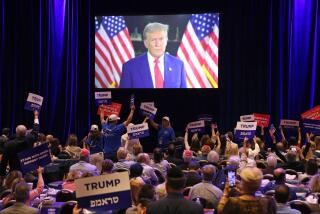Politics 88 : Jackson Vows He’d Take Issue of South Africa to a Floor Fight
- Share via
The Rev. Jesse Jackson, drawing his first line in the political sand of this summer’s Democratic convention, warned Monday that unless the party’s likely nominee agrees to declare South Africa a terrorist state, “we’ll meet each other on the floor in Atlanta.”
Jackson complained during a radio news conference in Los Angeles that Massachusetts Gov. Michael S. Dukakis has been “too cautious” in his reluctance to make such a declaration, which would carry stiff economic and diplomatic sanctions.
“If he will not bend on that matter, we’ll simply meet each other on the floor in Atlanta,” Jackson said. “South Africa as a terrorist state is a fact of life. Apartheid must end.”
Practical End of Candidacy
Although Jackson will continue to campaign after today’s elections in an effort to strengthen his influence on next month’s Democratic National Convention, the primaries mark, for practical purposes, the end of his candidacy.
Jackson wrapped up his nine-month quest for the Democratic nomination with a day of stumping from one end of the state to the other.
After the phone-in news conference with radio reporters from all four states holding primaries today, Jackson flew to Richmond for a rally and visited AIDS patients in a San Francisco hospice. He also was scheduled to make a final big appeal in a live half-hour broadcast from Los Angeles.
Pleads With Voters
Earlier, Jackson had pleaded with voters: “Do not be intimidated by the media,” which has declared Dukakis the Democrats’ inevitable nominee. He also told them to ignore the polls that show him trailing badly behind Dukakis.
Jackson said that the predominantly white news media were “bound by their own culture” in reporting and interpreting his historic presidential campaign but added that he has seen “an evolution in the media’s consciousness and its maturity.”
He took credit for “educating many members of the media. Some have made better grades than others.”
“I’ve taken the media to the low places. I’ve taken them to the ghettos, the barrios, the reservations,” Jackson said as he fielded telephone calls from California, New Jersey, New Mexico and Montana during the radio news conference. “The media people covering my campaign know more of America than their publishers do, than their editors do, and, therefore, their job will be to educate their bosses.”
He called on news organizations to be more aggressive in hiring and promoting women and minority members.
“I’m an odds breaker and a dream maker,” Jackson said. “I don’t follow opinion polls; I make opinion.” Today’s election, he said, is “a chance to set a national agenda . . . to vote for a new direction, the politics of change.”
Indeed, Jackson is still seen as having an opportunity to influence his party’s direction. He will go to the convention with more than 1,000 delegates, and Jackson’s enthusiastic support for Dukakis is seen as critical for motivating his supporters to vote in November.
Thus, the question dogging many party leaders has become: “What does Jesse want?”
The issue of declaring South Africa a terrorist state is the first that he has explicitly threatened to fight all the way to the convention floor.
‘Real Character’
“South Africa gives us a chance to show our true greatness, our real character,” Jackson said at the Richmond rally.
Although Dukakis has not publicly accepted Jackson’s position that South Africa should be designated a terrorist state, he has appeared in recent weeks to be moving closer to Jackson’s stance in an apparent effort to head off conflict at the convention.
When asked in a recent interview whether any disagreement between the two camps would result from an attempt by Jackson to include in the party platform a declaration of South Africa as a terrorist state, Dukakis said Jackson’s position was “not a problem.”
Dukakis stopped short of voicing support for Jackson’s position, saying his campaign needed further time to determine what the consequences of including South Africa on the terrorist list might be.
But he said he believed that “the sanctions we currently impose against South Africa effectively do what the designation would trigger,” adding that he favored “tough sanctions which . . . go far beyond what happens if they are designated a terrorist state.”
The effect of current U.S. laws governing relations with terrorist states and with South Africa appear to be similar but not identical.
Restrictions on Arms Sales
The Arms Export Control Act bans arms sales to any state determined to have repeatedly provided support to international terrorism, and an amendment to the Export Administration Act severely restricts sales of other goods determined likely to contribute to the state’s military potential or its ability to support acts of international terrorism.
Such arms sales to South Africa are banned under the 1986 comprehensive Anti-Apartheid Act, though that law does not include language specifically aimed at goods deemed beneficial to terrorists.
Another provision of U.S. law calls for the cessation of all military and economic aid to terrorist states, with exceptions to be made on humanitarian grounds. The U.S. government currently provides only humanitarian assistance to South Africa.
Staff writer Douglas Jehl in Washington contributed to this story.
More to Read
Get the L.A. Times Politics newsletter
Deeply reported insights into legislation, politics and policy from Sacramento, Washington and beyond. In your inbox twice per week.
You may occasionally receive promotional content from the Los Angeles Times.










